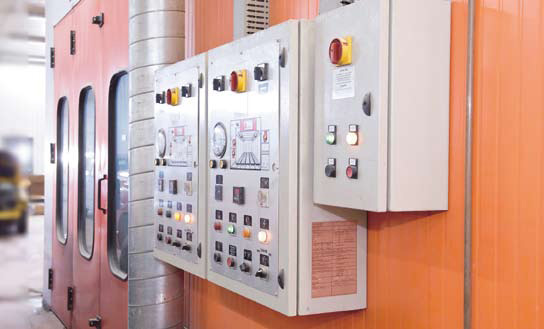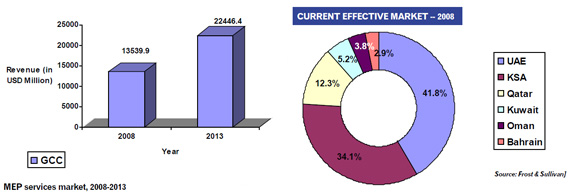Frost and Sullivan Report says that MEP Services are set to expand in Saudi Arabia and Qatar
Frost and Sullivan Report says that MEP Services are set to expand in Saudi Arabia and Qatar
Saudi Arabia and Qatar have better prospects for MEP services among their peers in the Gulf Co-operation Council bloc. Not only their exposure to global financial market has insulated these two economies from the credit crisis, their governments’ increased spending on infrastructure projects also made them more attractive to contractors engaged in mechanical, electrical and plumbing services.

Ventilation control panels: Mechanical services accounted for 37.6% of the overall 2008 MEP market in the Gulf
“The infrastructure sector is set to benefit from the portion of this spending,” says the research and consultancy firm, Frost & Sullivan. “Hence, these two markets are emerging as better growth prospects for MEP services among the GCC countries in the future.”
MEP services will grow marginally until 2013 and generate revenues of $22.45 billion after an estimated gradual pick up from next year following last year’s decline. This translates to a compound annual growth rate of 10.6% from 20008, when the market was placed at $13.54 billion, according to a 2010 report released by Frost & Sullivan.
Titled “Strategic analysis of the mechanical, electrical and plumbing services market in [the] Middle East”, the report said the mechanical services accounted for 37.6% or $5.09 billion of the overall MEP market while the electrical services made up 43.2% ($5.85bn) and, plumbing, 19.2% ($2.6bn).
Accounting for 72.6% of the 2008 MEP market, the commercial, residential, hospitality and infrastructure segments were the major end-user of services while the industrial, institutional, government and other buildings held the remaining 27.4% market share.
Being closely associated with the construction sector, the MEP work makes up 25-30% of total project costs, stresses the report authored by Vivek Vijayakumar, Frost & Sullivan’s research analyst on environment and building technology practice for South Asia and the Middle East. It remarks, “MEP is mandatory and considered as the ‘serviceon- demand’ within the construction industry.”
The boom in the construction industry, coupled with economic expansion and population growth, makes the UAE, Saudi Arabia and Qatar the key contributors to the growth of MEP in the Gulf. These economies account for a combined share of 88.2% of the regional market while Kuwait, Oman and Bahrain share the remaining 11.8%.
In the UAE, it’s Abu Dhabi that is expected to drive the demand for MEP services, owing to the slowing of construction sector in Dubai. These two emirates, however, are still the country’s leaders with higher margins and growth opportunities. The other emirates have the advantage of lower business costs and limited competition but are less profitable.
With the construction boom, many new entrants are now trying to make their mark in a market where there is a dearth of quality contractors and where some of established contractors are struggling for profits. “The competitiveness is believed to be sustained only if a company has a substantial operating history, proven track record and reputation in the market,” the report says. “In the future, the competition could be encountered by new entrants, who are into diversified business segments attempting to consolidate into MEP contracting services market.”
The future also looks bright on various development projects to be undertaken by governments, the report notes. “The global financial crisis has halted/postponed/ cancelled many projects in the private sector; therefore, government spending in residential, commercial, hospitality and infrastructure projects [is] likely to drive the demand for MEP services market in the future.

Copyright © 2006-2025 - CPI Industry. All rights reserved.